- Mercedes-Benz DRIVE PILOT now certified in the state of California
- First SAE Level 3 conditionally automated driving approved for use in California in standard-production vehicles
- DRIVE PILOT available in the U.S. for model year 2024 S-Class and EQS Sedan models, with the first cars delivered to customers in late 2023
Mercedes‑Benz today announced that its class-leading DRIVE PILOT system for SAE Level 3[1] conditionally automated driving received certification from California state authorities. With this significant milestone Mercedes-Benz is the first car manufacturer with authorization to introduce such a SAE Level 3 system in a standard-production vehicle for use on public freeways in the most populous state in the United States. DRIVE PILOT will be available in the U.S. market as an option for model year 2024 Mercedes‑Benz S-Class and EQS Sedan models, with the first cars delivered to customers in late 2023. The state of Nevada already confirmed the compliance of the system with state regulations in January 2023, and Mercedes‑Benz has the ambition to further expand availability of this groundbreaking system to additional markets in the future.
”Mercedes-Benz DRIVE PILOT is the world’s only SAE Level 3 system with internationally valid type approval. It builds on a very robust foundation, setting new industry standards. DRIVE PILOT uses a highly sophisticated vehicle architecture based on redundancy with a multitude of sensors enabling comfortable and safe conditionally automated driving. The certification by the authorities in California and in Nevada once again confirms that redundancy is the safe and thus the right approach.”
Markus Schäfer, Member of the Board of Management of Mercedes‑Benz Group AG, Chief Technology Officer, responsible for Development and Procurement.
DRIVE PILOT: SAE Level 3 system for conditionally automated driving
During a conditionally automated journey, DRIVE PILOT allows the driver to take their mind off the traffic and focus on certain secondary activities[2]. When DRIVE PILOT is active, applications can be enabled on the vehicle’s integrated central display that are otherwise blocked while driving.
On suitable freeway sections and where there is high traffic density, DRIVE PILOT can offer to take over the dynamic driving task, up to speeds of 40 mph. The control buttons required for this are located on the steering wheel rim, on the left and right above the thumb recesses. Once conditions are suitable, the system indicates availability on the control buttons. When the driver activates DRIVE PILOT, the system controls the
speed and distance, and effortlessly guides the vehicle within its lane. The route profile, events occurring on the route and traffic signs are correspondingly taken into consideration. The system also reacts to unexpected traffic situations and handles them independently through evasive maneuvers within the lane or by braking maneuvers for example.
If the driver fails to take back control even after increasingly urgent prompting and expiration of the takeover time (e.g., due to a severe health problem), the system brakes the vehicle to a standstill in a controlled manner while engaging the hazard warning lights. Once the vehicle has come to a standstill, the Mercedes‑Benz emergency call system is activated and the doors are unlocked to ensure the vehicle is accessible for first responders.
“We are extremely proud to continue our Level 3 conditionally automated driving leadership and remain at the forefront of innovation in the U.S. market with certification in California. This game-changing system underscores our ambition to lead in safety and technology, and provides unparalleled convenience for our valued customers by giving them back time while safely navigating today’s congested freeways.”
Dimitris Psillakis, President and CEO of Mercedes-Benz USA
Redundancy as key enabler for safe operation
The top priority for Mercedes‑Benz when introducing any such system is safety, which includes high demands on operational reliability. DRIVE PILOT builds on the surround sensors of the Driver Assistance Package and comprises additional sensors that Mercedes‑Benz considers indispensable for safe conditionally automated driving. These include LiDAR, as well as a camera in the rear window and microphones for detecting emergency vehicles, as well as a road wetness sensor in the wheel well. A vehicle equipped with the optional DRIVE PILOT system also has redundant steering and braking actuators and a redundant on-board electrical system, so that it remains maneuverable even if one of these systems fails and a safe handover to the driver can be ensured.
Outlook into the future: Cooperation is an essential part of Mercedes-Benz’s strategy
Mercedes-Benz is focusing on SAE Level 3 conditionally automated driving with the ultimate goal of driving at speeds of up to 80 mph (130 km/h) in its final iteration. Additional redundancy in sensing modalities will ensure that the system meets the highest Mercedes-Benz safety standards. To achieve this ultimate goal, the company has partnered with strong players like NVIDIA and Luminar, which are perfect additions to the existing roster of first-class cooperations with leading and cutting–edge tech-companies. This latest significant achievement of SAE Level 3 by Mercedes-Benz marks a huge milestone for automated driving and partnerships will increase the company’s level of ambition regarding what is possible in future.
[1] SAE Level 3: the automated driving function takes over certain driving tasks. However, a driver is still required. The driver must be ready to take control of the vehicle at all times when prompted to intervene by the vehicle.
[2] Which secondary activities of the driver are legally permissible depends on the respective national road traffic regulations.


